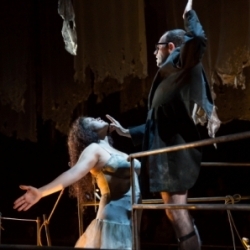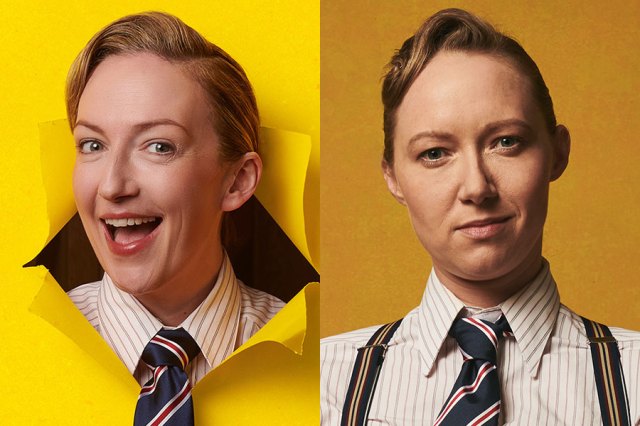Quartett (Royal Opera House)
The UK premiere of Luca Francesconi’s ‘post-apolcalyptic opera’ is presented in a reconfigured Linbury Studio

© Stephen Cummiskey / ROH 2014
The first stumbling block is the issue of why Luca Francesconi‘s opera needs to exist in the first place. It is based on a layered, self-sufficient play of ideas by the German writer Heiner Müller to which the imposition of music appears to add nothing. Müller envisioned a post-apocalyptic world in which the last two characters alive were futuristic versions of the Vicomte de Valmont and the Marquise de Merteuil, the corrupt couple at the heart of Les Liaisons dangereuses.
Play-acting their way through their own and other characters from Laclos’ epistolary novel (best known to a wider audience from Dangerous Liaisons, Stephen Frears’s film of Christopher Hampton’s dramatisation), Valmont and the Marquise revisit the past and recall the luxury of their celebrated depravity, but they can never reach out to each other.
The play’s examination of human isolation in a broken society is disturbing, and Fulljames has created sordid, filthy environment (brilliantly realised in designs by Soutra Gilmour) that matches its themes. A neatly-conceived traverse stage, overhung with rancid lace curtains and with the excellent London Sinfonietta under Andrew Gourlay playing from a pit directly beneath it, looks set fair to suck the audience’s imaginations into its maw. The fact that it never does is down to the composer.
The libretto, sung in English, is Francesconi’s own. Is it translated? The programme doesn’t say, but lines like "We see the parade of young buttocks" are more idiotic than idiomatic. Perhaps it’s a mercy that the subtitles (not 'sur-' on this occasion) are projected so far below the eyeline of most audience members that few will see them, although the two singers do their best to get the text across.
"the incarnation of putrified desires"
Saddled with a score that sounds as though it was cobbled from offcuts of contemporary music, Leigh Melrose and Kirstin Chávez gave supremely committed performances – as no doubt will Mark Stone and Angelica Voje on alternate nights as they share the opera’s straight ten-day run in the Linbury Studio. Self-abasement of a non-musical kind is built into Fulljames’s interpretation (images from earlier productions look to have been oddly clean-limbed); it’s the incarnation of "putrified desires" as a living hell, although Chávez was extremely fortunate to have discovered a car battery that weighed barely more than a cup of water.
The music tries everything to keep our attention and perhaps that’s why it falls short. If Francesconi has a voice of his own I failed to locate it amid the sound effects, recorded embellishments and what felt like random shreds of Berg and Berio. In the age of Julian Anderson, George Benjamin and Tarik O’Regan, to name just three composers of exciting new operas, it’s a pretty retrograde brand of modernism.
"Welcome to sin!" declares the Marquise early on. Thanks, but I’m with Boy George on this one. I’d rather have a cup of tea.












